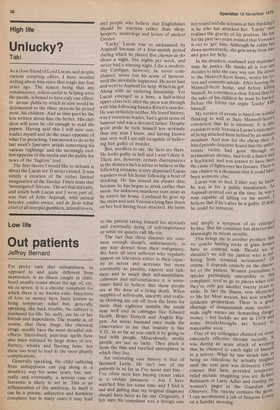Low life
Out patients
Jeffrey Bernard
I'm pretty sure that unhappiness, as opposed to and quite different from depression, is an illness caught in childhood usually round about the age of, say, six or seven. It is a chronic complaint for which there is no known cure. Injections of love or money have been known to bring temporary relief but, generally speaking, like back trouble, the sufferer is lumbered for life. So, sadly, are his or her friends and dependants. The trouble is, of course, that these drugs, like chemical drugs, usually have the most dreadful side effects. Short-lived, pain-free spells have also been initiated by large doses of sex, flattery, whisky and fleeting fame, but these too tend to lead to the most ghastly complications.
Generally speaking, the child suffering from unhappiness can jog along in a desultory way for some years, but, normally and eventually, a serious case of fantasitis is likely to set in. This is an inflammation of the ambition. In itself it can be a private, subjective and harmless complaint but in many cases it may lead to the patient taking himself too seriously and eventually dying of self-importance or what we quacks call Me-itis.
The fact that these diseases are common enough doesn't, unfortunately, in any way detract from their malignancy. We have all seen sufferers who regularly appear on television either in their capacity as actors and actresses but more commonly as pundits, experts and linkmen; and to watch their self-assuredness, calmness and self-confidence it is sometimes hard to believe that these people are at the door of a living death. When supplies of self-doubt, sincerity and realistic thinking are cut off from the brain for more than eighteen months the result may well end in cabbages like Edward Heath, Bruce Forsyth and Angela Rippon. An astute barmaid once made the observation to me that insanity is like V.D., in so far as you catch it by going to bed with people. Miraculously, media people are not so lucky. They pluck it from the thin and rarefied atmosphere in which they live.
An interesting case history is that of Bernard Levin. He isn't one of my patients in so far as I've never met him — I've often seen him buying cream cakes in a certain patisserie — but I have watched him for some time and I find it sad and galling that my original diagnosis should have been so far out. Originally, I felt sure his complaint was a benign one and simply a symptom of an enlarged, by-line. But his condition has deteriorate' alarmingly in recent months. This brings me to another problem that we quacks hurling rocks in glass houses have to contend with. Should we or shouldn't we tell the patient who is silt fering from terminal seriousness? 0' course, it depends entirely on the charge' ter of the patient. Women journalists, species particularly susceptible to this, complaint, tend to go to pieces when toll.' they've only got another twenty years tn, write. In fact the illness, now shortenen to Ms for Most serious, has now reached epidemic proportions. There is a great shortage of unsqueamish male nurses -male night nurses are demanding danger money — but luckily we are in 1978 and some breakthroughs are bound t° materialise soon.
One of my colleagues chanced on sorne extremely effective therapy recently. It was during an acute attack of weepingf that he chanced to catch sight of himsel in a mirror. What he saw struck him a! being so ridiculous he actually lauglleu until the next post was delivered. Other courses that have provided tempo relief include imagining you are Robert Robinson or Larry Adler and reading the, women's pages in the Guardian an Observer. The vaccine contains the germ: I can recommend a jab of Suzanne LowrY on a Sunday morning.


































 Previous page
Previous page